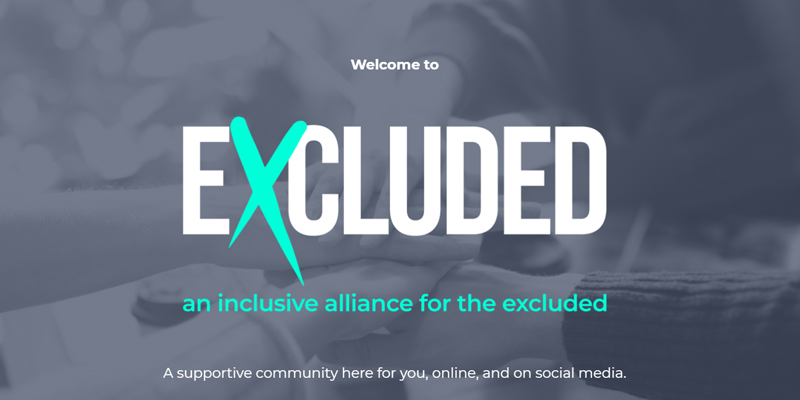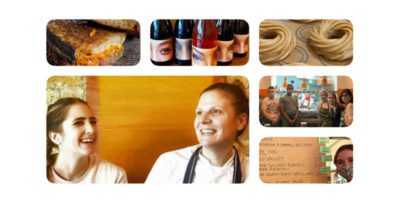Anneka Hicks is the founder of ExcludedUK, a grassroots non-profit organisation committed to providing personal, business and career support to those facing hardship as a result of the Covid-19 pandemic. Four years ago, Anneka launched Cloud10 Marketing, an account-based, data-driven, inbound marketing consultancy, which has suffered significant losses in turnover due to the lockdown, when all external contracts were frozen. She then, excluded from Government support, founded ExcludedUK with two other colleagues to support people in the same situation as her.

“Within our community, 1 in 5 feel they’re at risk of losing their home; 14% of the community have admitted they have had suicidal thoughts or self-harmed. This is more than 3.5 times the UK standard, and is largely attributed to debt, of which our community have no option to take, and very little hope or idea of how to repay these debts going forward in such an uncertain economy.”
My journey until setting up my own business
I come from a single-parent family, and grew up on a council estate. I went to a local secondary school and studied psychology, English language and English literature at the local college as A-Levels, but left at the age of 17 when I was offered a full-time job in the local Carpetright!
My first REAL job was in traditional advertising, selling space to local businesses in the weekly newspaper. At the age of 23, I did a management buyout of my local commercial radio station and was responsible for the income of the station, branding it, building its listenership and as a result, we won an Arqiva award for the fastest-growing independent radio station in the South East.
Having taught myself graphic design, basic coding and web design and moving into digital marketing scene in the mid-2000s, I stepped out of that. I sold my shares to kit myself out with a fully Apple-branded office and set up as an independent marketing consultant for independent local businesses helping them build their first websites, advertise in print and on-air, and build out the marketing and sales technology platforms to improve efficiency and focus on return on investment.
After landing a contract with a technology reseller in 200, who brought over technology solutions from Silicon Valley, I found myself in an industry that satisfied my passion for marketing and technology and spent the next ten years working within various IT and telecoms companies developing marketing infrastructure at board. I launched Cloud10 Marketing in 2016 and built it up to nine employees across four different countries at its peak.
But then the pandemic hit…
In March 2020, we lost 95% of our revenue over-night based on the fact our customers were so badly impacted. I furloughed my staff and topped them up to 100%, but realised that as a company owner I was ineligible for the Self-Employment Income Support Scheme (SEISS) and taking furlough meant I was unable to service the 5% of remaining trade I had.
I worked with a number of self-employed contractors/freelancers and, within the first few weeks, realised some of them had fallen outside of the eligibility criteria for SEISS too having only been self-employed for less than a few years, or working freelance alongside a part-time PAYE role.
In addition, I had recruited two new members of staff, both of whom were due to start on 2nd April. I had to retract both their contracts after lockdown and laden with guilt, due to their start date, discovered I was unable to furlough them too.
Fighting for the excluded
The next few weeks I realised that the extent of the eligibility criteria on the Chancellors ‘unprecedented support schemes’ meant that a significant amount of people were falling through the gaps.
Joining up with a couple of other company owners in the same boat that I’d met in a Facebook group in April, we began to acknowledge that despite Rishi Sunak pledging that “no one would be left behind” and that the Government would do “whatever it takes”, that many campaign groups were beginning to form to support those particular groups who were left denied access to the support.
On the 15th May, we decided that we would launch a non-profit organisation to bring together the people left excluded from various schemes to see if we could encourage them to help and work with others in the same situation.
We wanted to help people pool resources, develop their businesses, use people who had lost out, buy from each other, support each other and unite to encourage everyone to support all of the other campaign groups and their messages to draw attention to the scale of the issue and hopefully get the injustice overturned!
Who are the excluded?
There are around three million UK Taxpayers affected. Either largely or entirely excluded from the Government’s support schemes, these people find themselves arbitrarily excluded from the same support from others based on a date, or based on the way they manage their tax affairs.
With over 14 different groups identified, across a wide range of industries, there is no specific age group or demographic that is particularly affected more so than others.
ExcludedUK represents those who have been unable to access the Coronavirus Job Retention Scheme (CJRS, furlough scheme), which includes new starters changing jobs at the wrong time, those who had been on parental leave, and those whose employers simply weren’t able/decided not to furlough them.
Additionally, we also represent those who were unable to receive SEISS, which provided 80% of the average income to those who were eligible in the form of three grants. Those who fell outside of that criteria included:
- Those who were ‘newly self-employed’ and were unable to provide 2018/19 self-assessment records;
- Those who weren’t ‘majority self-employed’, for example, those who had part-time jobs, were transitioning from PAYE to self-employment, and/or those who had received payments within the last few years such as pension payments, inheritance etc. that brought down their average self-employment income over the last three years;
- People who paid themselves over £50k, even by a pound, weren’t allowed up to the cap of £2,500 per month like those who were furloughed on salaries of over £50k.
‘PAYE Freelancers’ are those who may work on short-term PAYE contracts (like for the BBC) and who are taxed at source, yet were unable to claim SEISS or CJRS and have received nothing.
For eight months now, too many have been living on/exhausting savings, that as a self-employed person is essentially their pension. Many who aren’t fortunate enough to have savings have no other options provided by the Chancellor except for debt and deferrals, which in our opinion is unacceptable when everyone has paid into a system that only a limited amount of the population can access in an emergency such as a global pandemic.
Mental health crisis
In a recent survey, we discovered that 62% of the community are unable to access Universal Credit. This may be because they live with a partner who may still have an income, or because they have savings in the form of pension savings, savings for future tax payments, or assets in the form of houses or ISAs.
Within our community, 1 in 5 feel they’re at risk of losing their home; 14% of the community have admitted they have had suicidal thoughts or self-harmed. This is more than 3.5 times the UK standard, and is largely attributed to debt, of which our community have no option to take, and very little hope or idea of how to repay these debts going forward in such an uncertain economy.
In the last fortnight, we have lost four members of our community to suicide, and in the last few months it’s become very apparent that we are on the brink of a significant mental health crisis.
Having initially signposted our members to existing charities and mental health support from the NHS, we were advised that the general waiting list for a referral through the NHS for support was 16 weeks.
With our inboxes becoming saturated with heartbreaking stories of desperation and pleas for urgent help, we quickly realised the existing mental health support programme was just not fit for purpose, so we began fundraising to match the professional practitioners within our community with those who needed urgent support, and at the end of October we were able to invest in a software platform that will allow us to provide dedicated urgent 1-2-1 sessions for our community members within 48 hours, something we’re hugely proud of, and that we know is already saving lives.
Feeling like we have been left behind
We have a community of over 60,000 members and to begin with, in March, the Chancellor acknowledged the gaps in support and announced that it was ‘too complicated’ to have rolled out schemes for more people in the time they had to do so. So, we waited…
Then, in early summer, when we started politely reminding him that there were still a huge number of people that HAD been left behind (which was backed up by a report from the Treasury Select Committee), the feedback from that was that actually it was now at the point in the journey that everyone should look forward, and that announcing new schemes to fill the gaps then (in July) would be too much of fraud risk, despite the fact that HMRC holds everyone’s tax records…
When it was announced that the gaps in support were a deliberate policy decision, it was at this stage we suffered the loss of some of our community members who felt they were unable to continue. People reported feeling ‘insignificant’, being made to feel like ‘collateral damage’, told they and their businesses or careers were ‘unviable’…
The impact of this on our members was sudden and severe. The lack of confidence people now felt, worthlessness, exhaustion, rejection, pain and unfairness. These are people who are inherently self-sufficient, who took the decision to carry themselves and build their own success and for many, provide opportunities and employment for others.
People who have never asked for help never had to rely on anything, have had everything taken away from under them through no fault of their own, without any warning. Some of whom who have exhausted a lifetime of savings they’ll never be able to recover. Some of whom will suffer from this for the rest of their lives. Some of whom face a decade (at least!) of debt they have no idea how to pay back, and who have now had to spend the money they had put aside for later life, for their children, for their pensions.
Reminder of the #peoplebeforepolitics Twitter Bomb tomorrow night 7.30-8.30pm. Please retweet and let’s make this the biggest one ever! #ExcludedUK @MetroMayorSteve @AndyBurnhamGM @SadiqKhan pic.twitter.com/U6QuuQONW5
— ExcludedUK (@ExcludedUK) November 16, 2020
Our supporters
We are working with a number of organisations, and in September we did a march alongside BECTU and Equity, from the creative sector. Alongside unions and membership bodies we are in regular contact with IPSE, the Institute of Directors (IoD) and the Federation of Small Businesses (FSB), and have formed a close allegiance with Money Saving Expert’s Martin Lewis who has been incredibly supportive of what we are doing as an organisation.
Additionally, we are working in partnership with national charities such as Stepchange, Rethink, Mental Health and Money Advice, the British Association for Counselling and Psychotherapy (BACP), and Red Umbrella, who are all very supportive of our goals to transform the future of mental health provision in the UK in order to help more people receive the support they need urgently.
Public perception needs to change
The Government announced they’ve launched the most generous package of support in the world. That may be true, but it’s been really unfairly distributed. It’s unjust and discriminatory to take the tax payments everyone has contributed to, and spend it in a way that excludes 10% of working people.
The people affected here are your beautician, your window cleaner, your bricklayer, your local schoolwear supplier, your local retailer, construction worker, hairdresser, taxi driver, artist, pet sitter, driving instructor, market trader, actor, disco provider, children entertainer, events worker…
We are a volunteer-run organisation, and we’re doing a huge amount for our members in order to build their confidence, and help them with career support, business advice, and ongoing development with the hope of creating a section of society who are incredibly resilient and successful in the face of adversity.
£30 provides one person with urgent support, so if anyone is able to donate to the cause our website is www.excludeduk.org/donate
Creating awareness
From setting up the largest All-Party Parliamentary Group with 279 MPs to having Keir Starmer ask about us in PMQs, this week has seen the backing of journalist heavyweights such as Good Morning Britain’s Piers Morgan, BBC Breakfast’s Naga Munchetty, and LBC’s James O’Brien, as well as stories in all of the weekend press, and local and national papers and radio.
On Thursday, we held a national press conference with Metro Mayors Steve Rotheram and Andy Burnham who have taken it upon themselves to get behind the campaign due to the extent of the impact across the UK and the pure injustice of it as a whole.
https://www.linkedin.com/in/annekahicksmarketing
https://twitter.com/annekahicks
https://www.facebook.com/excludeduk





